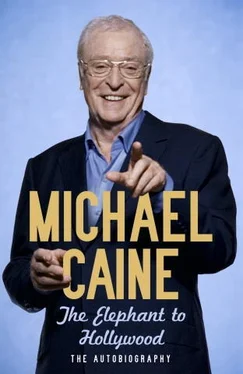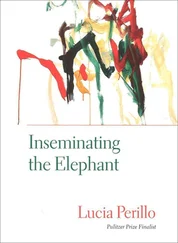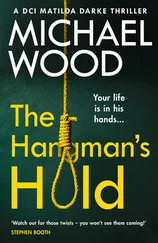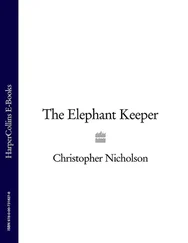Michael Caine - The Elephant to Hollywood
Здесь есть возможность читать онлайн «Michael Caine - The Elephant to Hollywood» весь текст электронной книги совершенно бесплатно (целиком полную версию без сокращений). В некоторых случаях можно слушать аудио, скачать через торрент в формате fb2 и присутствует краткое содержание. Город: London, Год выпуска: 2010, ISBN: 2010, Издательство: Hodder, Жанр: Биографии и Мемуары, на английском языке. Описание произведения, (предисловие) а так же отзывы посетителей доступны на портале библиотеки ЛибКат.
- Название:The Elephant to Hollywood
- Автор:
- Издательство:Hodder
- Жанр:
- Год:2010
- Город:London
- ISBN:978-1444700015
- Рейтинг книги:4 / 5. Голосов: 1
-
Избранное:Добавить в избранное
- Отзывы:
-
Ваша оценка:
- 80
- 1
- 2
- 3
- 4
- 5
The Elephant to Hollywood: краткое содержание, описание и аннотация
Предлагаем к чтению аннотацию, описание, краткое содержание или предисловие (зависит от того, что написал сам автор книги «The Elephant to Hollywood»). Если вы не нашли необходимую информацию о книге — напишите в комментариях, мы постараемся отыскать её.
The Elephant to Hollywood — читать онлайн бесплатно полную книгу (весь текст) целиком
Ниже представлен текст книги, разбитый по страницам. Система сохранения места последней прочитанной страницы, позволяет с удобством читать онлайн бесплатно книгу «The Elephant to Hollywood», без необходимости каждый раз заново искать на чём Вы остановились. Поставьте закладку, и сможете в любой момент перейти на страницу, на которой закончили чтение.
Интервал:
Закладка:
In fact I had only been back in Horsham a few weeks when I was summoned back to hospital. The army had found a tropical diseases expert who had come up with a cure for my particular type of malaria and I was to be part of proving him right. I wasn’t the only one. When I arrived on the ward I found all my mates from the unit – and every one of them had turned the colour of a daffodil. We were strapped to our beds for ten days because the medicine we were given made our blood so heavy that if we moved, we would knock ourselves unconscious. I never found out exactly what it was that Colonel Solomons gave us to put us right, but I’m still here, I’m no longer yellow and the reason I leave England in the winter is because I never want to shiver again.
As soon as I’d fully recovered I rang Alwyn again to find out if the job was still open but while I’d been in hospital the company had folded. I never saw Alwyn or Edgar again – although years later, when I was in Beverly Hills, I got a letter from a social worker in Hammersmith, London. He said he had an old man called Alwyn D. Fox lying destitute in one of his wards. Mr Fox, he said, was claiming he had discovered Michael Caine. In all likelihood it was fantasy, but if there was any truth in it, would I mind writing Mr Fox a letter and perhaps sending a small amount of money to make his last few weeks a bit easier? I wrote at once to confirm Alwyn’s story and enclosed a cheque for five thousand dollars. Two weeks later I had another letter from the social worker, returning the cheque. Alwyn had been delighted to get my letter, he wrote, and had spent the day he received it showing it to everyone on the ward. He had died later that night.
No Alwyn Fox meant no job for me, so I headed back to Solosy’s to pick up another copy of The Stage . My time at Horsham meant that I had left the Assistant Stage Manager category behind and could now (with a certain amount of artistic licence) call myself an ‘experienced juvenile’. Unfortunately, my artistic licence extended a bit too far and I added the part of ‘George’ from George and Margaret , a popular play that would have been the next production at Horsham, to my list of parts. When I got to one audition, in a theatre in the east-coast town of Lowestoft, I was taken aback to find that the seventy-year-old director seemed a bit hostile. ‘It says here, you played George in George and Margaret ,’ he said. Something was clearly not right. ‘Well, I did,’ I retorted, determined to stick to the story. ‘Well, you’re a bloody liar!’ he roared. ‘You’ve never even seen the play – or you’d know that the cast spends two hours waiting for George and Margaret to turn up and they never do!’
In spite of this – perhaps he liked the way I’d acted so indignant – I got the job. I learnt a great deal from this wily old man. Three pieces of advice in particular have always stuck in my mind. In one play I did in Lowestoft I was cast as a drunkard and at the first rehearsal I came rolling onto the stage and staggered about. The director held up his hand to stop proceedings. ‘What do you think you are doing?’ he demanded. Feeling rather aggrieved, I said, ‘I’m playing a drunk.’ ‘Exactly,’ he said. ‘You are playing a drunk – I am paying you to be a drunk. A drunk is a man who is trying to act sober; you are a man who is trying to act drunk. It’s the wrong way round.’ Spot on. Another time I was on stage, but not speaking. The director held up his hand and said, again, ‘What do you think you’re doing?’ ‘Nothing!’ I replied. ‘Exactly,’ he said. ‘You may not have any lines, you are on stage and you are listening to what’s being said and in fact you have wonderful things to say, but you have just decided not to say them. You are every bit as much part of the action as the people who are speaking. Half of acting is listening – and the other half is reacting to what’s been said.’ Spot on. I also remember a scene in which I had to cry. I thought it was going very well, but again the director stopped me with the line I was hearing rather too frequently for my liking. ‘What do you think you’re doing?’ he shouted. ‘Crying,’ I said, rather offended that he appeared unmoved by my performance. ‘No, you’re not!’ he said. ‘You’re an actor trying to cry. A real man is someone who is trying desperately not to cry.’ Spot on, again.
I was keen enough to abide by the rules of theatre when it came to acting but I was determined not to let my lowly status as juvenile lead interfere with my love life. I had fallen in love with an impossible dream – Lowestoft’s leading lady, Patricia Haines. Pat was absolutely gorgeous, two years older than me, light years away in sophistication and a brilliant actress who didn’t have to add any extra parts to her CV. However, although she was always polite, she didn’t seem to have really noticed me at all, in fact she didn’t seem to have noticed that the company even had a new juvenile lead, no matter how often I hung around casting meaningful glances in her direction.
Things went on this way for a couple of weeks and then, one night after the show, one of the actors gave a party. As usual, Pat was the centre of attention. As usual, she acknowledged me with a brief smile and then ignored me. Realising my love for her was forever doomed to be unrequited, I settled down to concentrate on getting thoroughly plastered. I sat there alone all night, mired in misery, until the party began to fold. Just as I was contemplating an unsteady return to my lonely digs, I heard a voice from behind me. ‘Are you shy?’ I jerked round to see Pat standing there, all five feet nine of her (plus her three-inch heels). ‘Shy?’ I lurched to my feet, spilling my drink down my trousers. ‘Me? What makes you say that?’ She was a blunt Northern lass. ‘Because I can see you fancy me and you’ve not even tried to make a pass.’ A pass? Was she mad? Me, make a pass at Pat Haines? I wobbled there for a moment, intoxicated not just with cheap beer but by her closeness and the smell of her perfume, and then I took the plunge. What did I have to lose, after all? With all the confidence I could muster from all the Bogart films I had ever seen, I looked her straight in the eyes. ‘I’m in love with you,’ I said. There was absolute silence for a minute. The blood was pumping through my head so strongly I had to lean forward to catch her reply. ‘I know,’ she said with a smile. ‘And I’m in love with you, too.’ This time I knew just what to do. I leant forward and kissed her.
Pat and I were married a few weeks later in Lowestoft. Pat’s parents, Claire and Reg, came down from Sheffield and although they made the best of things, it was clear that they thought the marriage wouldn’t last.
And of course they were right. We left Lowestoft for London but it was a very hard first few months. We were renting a small flat in Brixton from my Aunt Ellen, the first person in our family to own their own house, and it was just as well she let us have it cheap, because neither of us was making it big. After a very dry period in which I only got a few walk-on parts in television, I gave up looking for acting work and took a series of dead-end jobs to support Pat while she pushed on with her career. It was soul-destroying – and it was about to get even more difficult, because Pat became pregnant. Our beautiful daughter Dominique was born to a father who simply wasn’t ready for her and couldn’t support her and under the strain our marriage broke down and I walked out. Pat took Dominique back to her family in Sheffield and Claire and Reg took on the job of bringing her up. I was in despair: I had no money, I was out of work and I had abandoned my wife and child. At twenty-three, I felt I had failed my family and myself and I was almost suicidal with worry.
Читать дальшеИнтервал:
Закладка:
Похожие книги на «The Elephant to Hollywood»
Представляем Вашему вниманию похожие книги на «The Elephant to Hollywood» списком для выбора. Мы отобрали схожую по названию и смыслу литературу в надежде предоставить читателям больше вариантов отыскать новые, интересные, ещё непрочитанные произведения.
Обсуждение, отзывы о книге «The Elephant to Hollywood» и просто собственные мнения читателей. Оставьте ваши комментарии, напишите, что Вы думаете о произведении, его смысле или главных героях. Укажите что конкретно понравилось, а что нет, и почему Вы так считаете.












